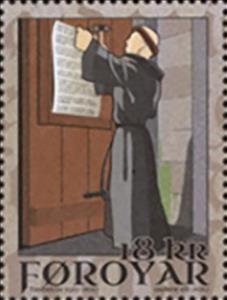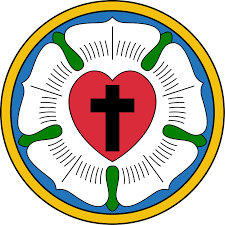Stamp: 500th Anniversary of the Protestant Reformation (Faroe Islands 2017)
500th Anniversary of the Protestant Reformation (Faroe Islands 2017)
02 October (Faroe Islands ) within release 500th Anniversary of the Protestant Reformation goes into circulation Stamp 500th Anniversary of the Protestant Reformation face value 18 Faroese króna
| Stamp 500th Anniversary of the Protestant Reformation in catalogues | |
|---|---|
| Michel: | Mi: FO 904 |
| Yvert et Tellier: | Yt: FO 900 |
| Colnect codes: | Col: FO 2017-07A |
Stamp is square format.
Also in the issue 500th Anniversary of the Protestant Reformation:
- Stamp - 500th Anniversary of the Protestant Reformation face value 18;
- Souvenir Sheet - 500th Anniversary of the Protestant Reformation face value 18;
|
Data entry completed
46%
|
|
|---|---|
| Stamp 500th Anniversary of the Protestant Reformation in digits | |
| Country: | Faroe Islands |
| Date: | 2017-10-02 |
| Emission: | Commemorative |
| Format: | Stamp |
| Face Value: | 18 Faroese króna |
Stamp 500th Anniversary of the Protestant Reformation it reflects the thematic directions:
An anniversary is the date on which an event took place or an institution was founded in a previous year, and may also refer to the commemoration or celebration of that event. For example, the first event is the initial occurrence or, if planned, the inaugural of the event. One year later would be the first anniversary of that event. The word was first used for Catholic feasts to commemorate saints. Most countries celebrate national anniversaries, typically called national days. These could be the date of independence of the nation or the adoption of a new constitution or form of government. The important dates in a sitting monarch's reign may also be commemorated, an event often referred to as a "Jubilee".
Lutheranism is a major branch of Protestantism that identifies primarily with the theology of Martin Luther, the 16th-century German monk and reformer whose efforts to reform the theology and practices of the Catholic Church launched the Reformation in 1517.Lutheranism subsequently became the state religion of many parts of Northern Europe, starting with Prussia in 1525.
Religion is any cultural system of designated behaviors and practices, world views, texts, sanctified places, ethics, or organizations, that relate humanity to the supernatural or transcendental. Religions relate humanity to what anthropologist Clifford Geertz has referred to as a cosmic "order of existence". Different religions may or may not contain various elements ranging from the "divine", "sacred things", "faith", a "supernatural being or supernatural beings" or "some sort of ultimacy and transcendence that will provide norms and power for the rest of life". Religious practices may include rituals, sermons, commemoration or veneration (of deities), sacrifices, festivals, feasts, trances, initiations, funerary services, matrimonial services, meditation, prayer, music, art, dance, public service, or other aspects of human culture. Religions have sacred histories and narratives, which may be preserved in sacred scriptures, and symbols and holy places, that aim mostly to give a meaning to life. Religions may contain symbolic stories, which are sometimes said by followers to be true, that have the side purpose of explaining the origin of life, the Universe and other things. Traditionally, faith, in addition to reason, has been considered a source of religious beliefs. There are an estimated 10,000 distinct religions worldwide. About 84% of the world's population is affiliated with one of the five largest religions, namely Christianity, Islam, Hinduism, Buddhism or forms of folk religion.



